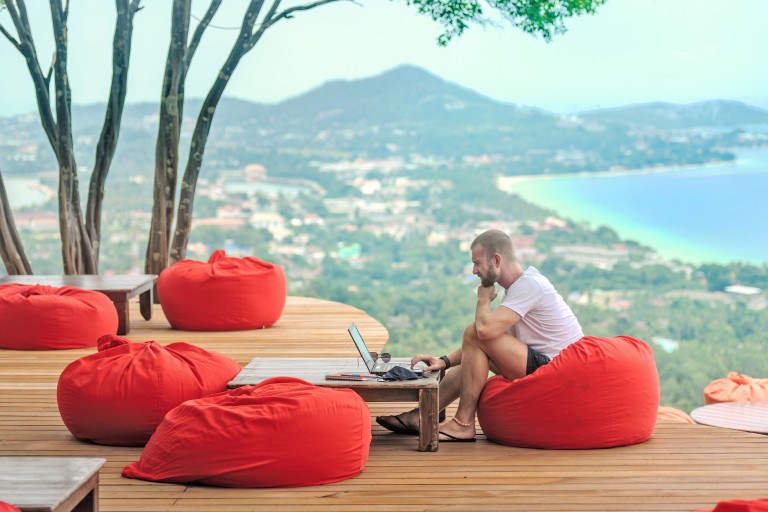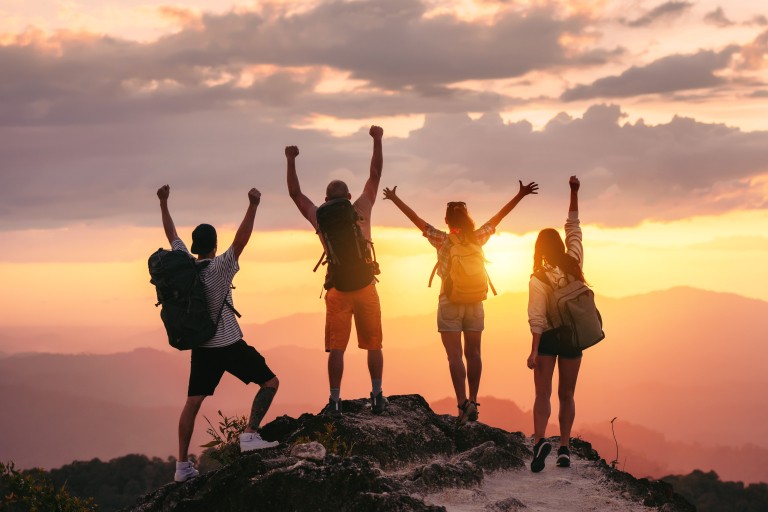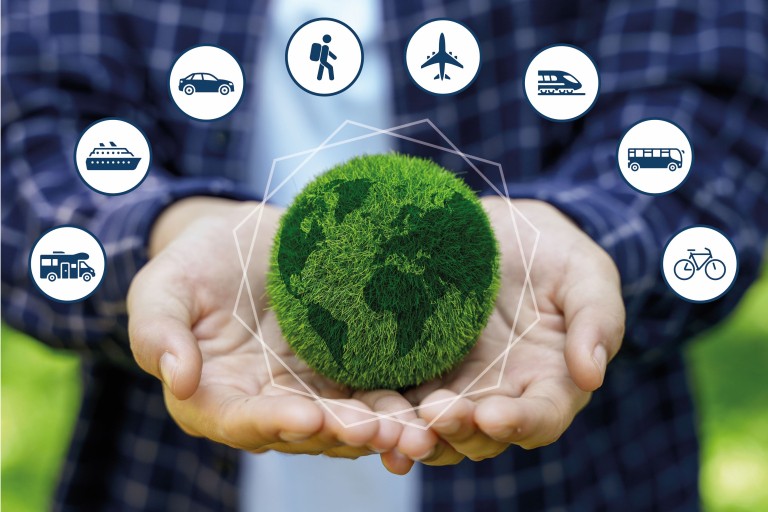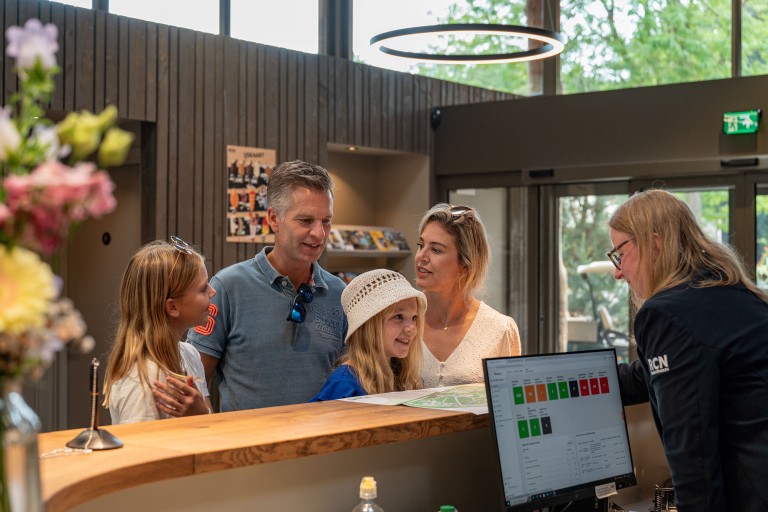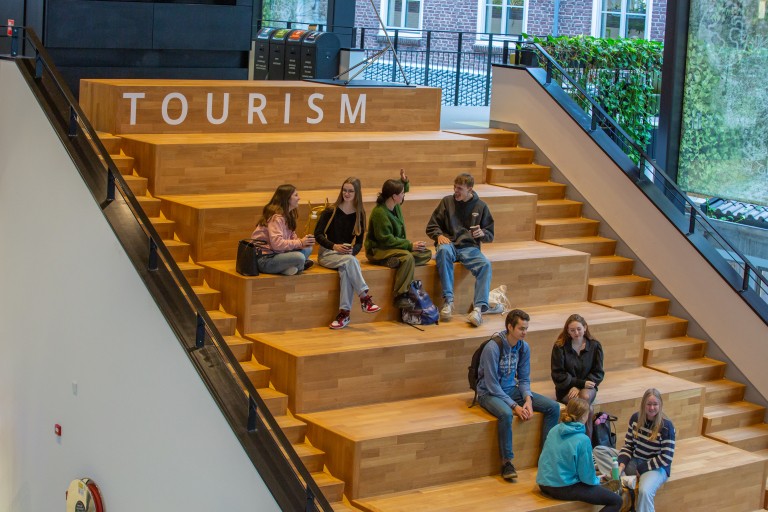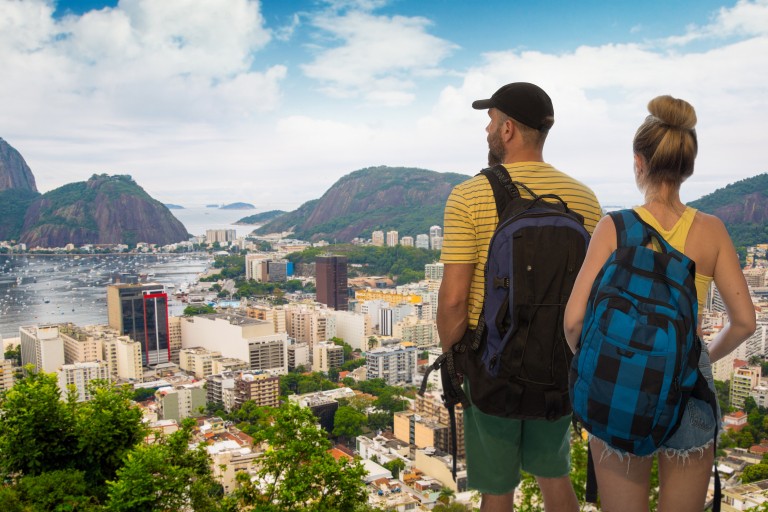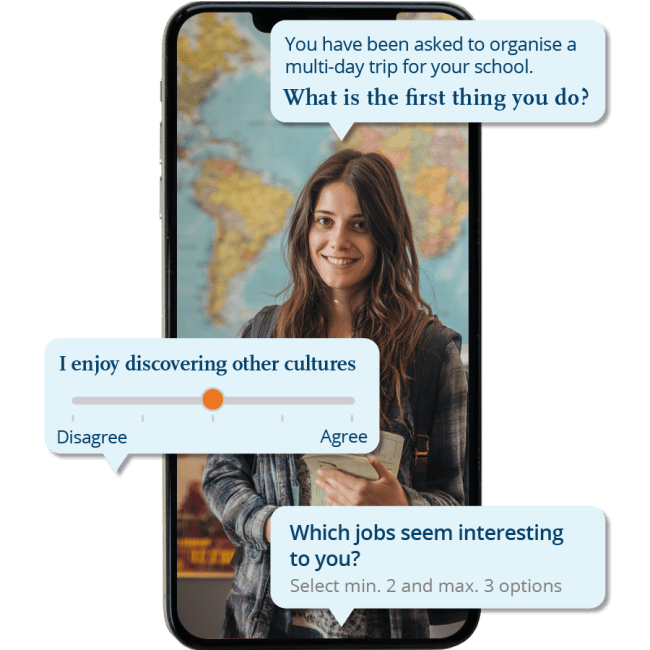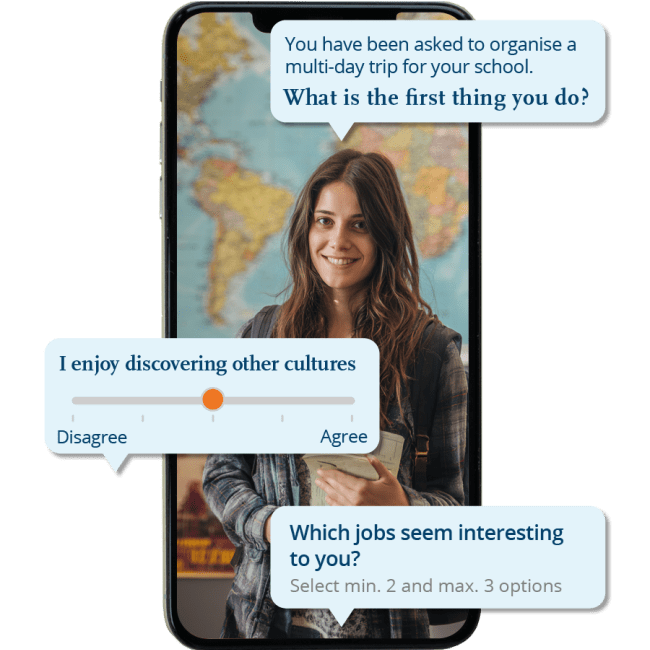Come and meet us
Walking around on campus is the best way to truly experience BUas. Sign up for one of the upcoming events or activities.
Do you want to make a difference in the world of travel and tourism?
Discover if a Tourism programme is right for you with our quiz.
- It only takes 3 minutes
- Your result in seconds
- Learn more about Tourism
Study overview
Year 1 consists of four nine-week blocks. In each block, you will work on a new project for real clients, introducing you to the dynamic field of tourism. This allows you to immediately apply theory in practice.
Topics such as tourism knowledge and skills such as research, business economics and marketing are covered in the projects.
- Block 1: Travel Experience Design
In this block, you will learn how to turn travellers' expectations into unforgettable travel experiences. This begins online, where we trigger feelings of 'wanderlust' in holidaymakers looking for travel experiences. 'Wanderlust' stands for the desire to step out of one’s own world for a while and experience something different. It is the urge to travel. If you can turn that into a fantastic product that travellers will want to book, then you are exactly what the tourism industry is after.
An assignment within this theme may be creating a new, meaningful travel concept for a small travel business or a big one like TUI.Want to know more about this project? Read here: Festive conclusion of block 1: Travel Experience Design.
- Block 2: Destination Development
In this block, you take the step from visiting a destination to understanding a destination. In other words, during this project, you will do research at the destination itself, which we call fieldwork. You will discover the story behind the destination and engage in conversation with stakeholders such as entrepreneurs and residents. And you will present your results in the form of a short film or documentary during the 'Untold Stories' film festival.
Curious? Take a look at an example of the block 2 presentation afternoon.
- Block 3: Travel Mobility
In this block, you will tackle the challenge of how we can travel - discovering the world and ourselves - while protecting the environment. You will explore the current landscape of tourism and travel and brainstorm ways to shake things up. Who and what do you need to consider? What trends and opportunities have the potential to reshape the way we travel – not only at the destination itself, but also the journey to get there? How do we make travel greener without losing the fun factor for everyone?
Curious about project examples? See how students explore the world of Travel Mobility.
- Block 4: Tourism Hospitality
You will look for new forms of hospitality in the context of tourism and leisure. We are all familiar with the idea of hospitality, but what exactly is it? What do tourists expect in this area today? Boundaries are blurring, with trends like ‘workation’, blending business and leisure. You will learn to experience the essence of hospitality in order to then use what you’ve learned to create ‘the holiday homes, safari tents or glamping lodges of tomorrow’.
In the first semester of year 2, you will work on two tourism projects. After that, you will have the opportunity to determine your own study route by choosing a challenge, an exchange or a placement.
A challenge is a form of education in which students, together with lecturers and professionals from the field, work on issues from the world around us. These are mostly real-world issues in society for which they develop solutions, aiming to improve the travel industry.
Available options:
Year 2:
- In semester 3: two tourism projects.
In semester 4: choice of tourism challenges or challenges in another BUas programme, exchange, minor, placement or specialisation.
Year 3
- In semester 5: choice of tourism challenges or challenges in another BUas programme, exchange, placement, placement or specialisation.
- In semester 6: tourism challenges or challenges in another BUas programme, exchange, placement, placement or specialisation.
Year 4
- In semester 7: choice of tourism challenges or challenges in another BUas programme, exchange, traineeship, minor or graduation project.
- In semester 8: choice of tourism challenges or challenges in another BUas programme, exchange, traineeship, minor or graduation project.
The basic rules are as follows:
- You will do a placement of at least one semester
- You can spend one semester doing an international exchange
- You can spend one semester doing a minor
- You will do one graduation project
- Placement
You will go on a placement of a minimum of twenty weeks. During your placement, you will gain practical experience, discover what suits you best and prepare yourself for a job in the tourism and recreation field. The programme has an extensive national and international network, offering a wide choice of placements, both at home and abroad. You can make use of this network or look for a suitable placement yourself. The student affairs team will support you in your search for a placement.
Do you think 20 weeks is not enough in terms of a placement? You can also choose to do several placements during your studies.
Here are a few placement examples:- Communication at Landal GreenParks
- Sun holidays at TUI
- Sustainability at Transavia
- Marketing & social media influencer at NBTC Holland Marketing
- EF International Language School in Madrid
- Marketing at Corinthia Hotels Malta
- Sales at Happy Gringo Travel in Ecuador
Read Rianne’s story to find out how everything she learned in her studies fell into place during her placement. And check out a day in the life of Jaleesa’s placement at EF International Language School in Sydney.
- Exchange
Studying abroad is the perfect opportunity to push your boundaries. You build up an international network, learn a new language, and gain insight into intercultural differences. BUas works with universities all over the world, so as an exchange student you have plenty of options.
- Minors
With a minor, you choose for yourself: do you want to specialise in your field or broaden your knowledge? You can take a minor at BUas, but you can also choose to do a minor at another Dutch university of applied sciences, or even abroad.
- Pre-master
In your final year of study, you may choose to attend the academic pre-master's track in Strategic Business Management and Marketing (SBM). This pre-master will give you direct access to Master of Science programmes at top universities such as Maastricht, Rotterdam, Tilburg, Antwerp (B), and Warwick (UK). You can also move on to our university master's degree in Leisure and Tourism Studies. This way, you can earn a university master's degree in just five years – or even in four years, through the accelerated (three-year) track.
- Foreign languages
Are you interested in a foreign language and culture, such as Spanish? If so, you can choose the minor in Language and Culture. We will immerse you in the culture of the country. You will join at your own level and learn what you need to be effective and successful in this language.
- Challenges
From semester 4 in year 2 onwards, you can choose a real-world challenge in tourism or another programme within BUas. These challenges typically address pressing societal issues where you will develop solutions to make the travel world more sustainable, inclusive and inspiring. You will have the freedom to design your own approach and take the lead in examining these complex issues from multiple perspectives, creating meaningful change through your research and creativity.
You choose a theme that you want to explore in depth, such as sustainable and digital transformation, business innovation, and the societal impact of tourism. You can choose to study one block and then switch to another theme, or you can choose to specialise in one theme for the rest of your studies.
- Attractions & Theme Parks Management
From the second year, you can choose to pursue the two-year Attractions & Theme Parks Management (ATPM) track. This is a specialisation offered to students from the Tourism Management, Facility Management, and Leisure & Events Management programmes.
Why this specialisation?
The number of attraction and theme parks is still growing and the competition is fierce. It’s not just theme parks that are constantly reinventing themselves; holiday resorts, zoos, shopping centres and museums - to name a few examples from your future field of work - also focus more and more on creating memorable experiences. In addition, there is still much to gain in terms of corporate social responsibility. In short, things can and must change to become more experiential and more sustainable.A new generation of managers
There is great demand for a new generation of managers capable of creating successful and meaningful concepts and experiences (concept design) from a business perspective (business design). In this specialisation, you will learn how to innovate products and services to create added value for both visitors and the company you work for.The challenge
There is no such thing as a one-size-fits-all business model in the world of attraction and theme parks. The challenge is to make the right combinations and come up with something that makes you stand out and builds goodwill. An example? Zoos are making a turn towards a more ethical and educational approach, whereas museums are adding a bit more experience and interaction. And theme parks try to immerse people in complete themed worlds. Digitalisation, AI and sustainability are playing an increasing role at all parks, and we also pay a lot of attention to these themes within BUas.What will you do?
You will dive into the world of marketing, finance, workforce planning and safety, because you need that knowledge. But you will also explore the fields of Hospitality, Imagineering and Storytelling. You will work on your creative leadership skills and learn about change management. Each course is linked to a real client from the world of attractions. During your studies, you can do a placement at ‘world parks’ such as Walt Disney World in Orlando, Europa-Park, and Efteling.More information can be found on the webpage of Attractions & Theme Parks Management.
- Social Innovation
Starting in your second year, you can dive into the three-year Social Innovation track. This is an ideal choice for anyone studying Tourism, Facility or Leisure & Events who is socially conscious and eager to make a meaningful contribution.
Social Innovation is all about coming up with solutions with people, not just for them. You will team up with fellow students in the Performatory on campus to brainstorm creative solutions to societal issues in areas like health, equality, human rights, and the environment.
Examples of project challenges include:
- Finding ways for tourism to benefit local communities
- Organising a dance party for people experiencing homelessness
- Designing future-ready workspaces
You will tackle real-world problems for all kinds of organisations, just think of sports events organisers, theatres, museums, festivals, and also healthcare institutions and governments. You will often work across different sectors, collaborating with new people while expanding both your network and experience.
Social Innovation at BUas boasts a vibrant community with diverse backgrounds and areas of expertise. A unique aspect of this track is that you get to shape your own learning journey.
You will choose your own topics and projects within a clear framework. Each year, you will engage in about eight hands-on projects, utilising design-thinking skills. What’s more, you will work in self-chosen teams, mixing with students from other years and programmes.
Here you can find more about the specialisation Social Innovation.
- Transformative Airlines and Airport Management (TAAM)
Aviation is changing rapidly – and with TAAM, you can be part of it! It’s a 2-year specialisation combining four fields: aviation, logistics, facility management and tourism. While others focus on just one aspect, you’ll learn how everything comes together to create unforgettable travel experiences. Students in Tourism Management, Facility Management, Logistics Management or Logistics Engineering who have successfully completed their first year can take this English specialisation in years 2 and 3.
You’ll become a leader in airport management and business strategy, with an eye for customer experience and sustainability. You’ll learn how to make the travel industry greener using smart technology and circular solutions. All of this in small groups, with personal guidance and direct contact with industry professionals.
Here you can find more information about this specialisation.
- Training company NewWays
From year 2 onwards, you can opt for a 20-week placement at our training company NewWays. You can also choose to complete a 40-week traineeship in your graduation year. At NewWays, you will organise a variety of trips and (business) events for BUas.
You learn by doing
During this programme, you will work on assignments for real companies. In year 1, you will start with projects, and from semester 4 of year 2 onwards, you can choose to take on challenges.
Projects follow a structured process with a clearly defined end goal. You will tackle real questions from actual clients in the industry. Challenges offer you and your team the freedom to define your own goals. These typically focus on societal issues where you will develop innovative solutions to make the travel world more sustainable, inclusive and inspiring. You are in control of the approach.
No timetable or traditional exam weeks
You do not have a changing timetable every hour. On Mondays, Wednesdays and Friday mornings, you work on your project or challenge on campus. You plan the rest of the week yourself: at home or at school, alone or with your group.
There are no standard exam weeks here – instead, you will be assessed through a variety of presentations, assignments and knowledge tests. This means no high-pressure snapshots of your performance, but rather a comprehensive view of your development over time.
Training courses, workshops and feedback sessions are offered to support you.
Learning community
You will work in a small group within a learning community. In a learning community, you learn by doing, researching, discovering, and reflecting together. You do this with students, lecturers and professionals from the field. In this way, you develop skills that you can put to good use later in the business world. You also work on individual skills.
In charge of your own educaton
You choose how and where you learn, together with your group or independently. You are allowed to make mistakes; that is how you learn. With the help of lecturers and fellow students, you develop ownership of your studies, something that will serve you well in the professional field. With us, you determine the focus of your studies and how and where you want to learn. This independent and active approach is essential preparation for your future career.
The study load amounts to an average of 40 hours per week per year. How many hours you actually spend studying varies greatly, depending on your personal approach, and fluctuates from week to week.
You will have 2.5 days of classes on campus, for example Monday (full day), Wednesday (full day), and Friday morning*. These are fixed days that remain the same throughout the year. During these days, you will follow a fixed and structured schedule of supervised work on your project and you are required to be present at school.
On the other days of the week, you will work independently or with your group on individual and group assignments. You can decide for yourself whether you want to do this on campus or from home, for example.
In short, on these days you will keep actively engaged with your coursework too. You will receive instructions from the lecturers and be inspired by mini-lectures that provide exactly the guidance and support you need to complete your assignments successfully.
* The definitive schedule may vary depending on specific circumstances and organisational changes.
- Personal development
The Lumina Spark method will help you discover who you are and what you have to offer. You will gain insight into your personal preferences, your behaviour and how you react in different situations. You will learn to look at yourself and others from different perspectives.
Self-awareness is the basis for many personal and professional skills that you can use in your future personal and working life, such as reflection, effective collaboration, giving feedback, and dealing with stressful situations. By understanding yourself and others better, you take a big step towards success.
- A typical week
A typical week in year 1 of the Tourism Management programme in academic year 2024-2025 will look like this for you: Monday (full day), Wednesday (full day) and Friday (morning) you will work on a project at school in your learning community. During these days, you will follow a fixed and structured schedule of supervised work on your project. During these days, your attendance at school is compulsory. On the other days of the week you will work independently or with your group on individual and group assignments. You will decide for yourself, or in consultation with your group, whether you do this at school or from home. In short, on these days too, you will be actively involved in your education.
Daily structure on Monday (full day) – Wednesday (full day) – Friday (morning):
- 10.00 to 12.30 hrs: supervised work on your project
- 13.00 to 16.00 hrs: supervised work on your project
During the projects, you will work together intensively with various lecturers and students. You will receive instructions from your lecturers and be inspired by mini-lectures that will give you the right guidance to do your project well.
Please note: This description gives a general idea of a typical week of first-year students in the 2024-2025 academic year. No rights can be derived from it. The final study timetable may vary depending on specific circumstances and organisational changes.
Student well-being
BUas encourages and helps you to make the most of yourself, whatever your circumstances. Maybe you have a chronic illness, are a family carer, a competitive athlete, or juggle your studies with running your own business? Our study coaches, student counsellors and student psychologists are here to help. Do you need extra support or advice? Or extra facilities? Then take a look at the options here.
From year 2 onwards, you choose a theme that you want to explore in depth and tackle challenges related to this theme. You can choose a different theme for each block, or you can choose to specialise further within a single theme. You can also opt for two- or three-year specialisations in collaboration with other programmes.
- Travel Mobility Theme
Exploring and developing responsible ways of travelling. An example of a challenge is the question: How can you motivate adventurous travellers to travel by train instead of by plane? What solutions can you come up with – for Eurail, for example – to make travelling by train within Europe easier?
- Tourism Hospitality theme
Exploring and combining new forms of hospitality in tourism. How can you take hospitality to the next level and integrate it more seamlessly into products like cruises, holiday parks, and day attractions?
- Destination Development theme
This theme focuses on designing attractive tourist destinations that benefit both visitors and residents. It is all about ‘Rethinking Tourism’ during fieldwork. How will you make a personal impact on destinations by developing sustainable solutions for local tourism businesses?
- Travel Experience Design theme
Transforming travellers' expectations into unforgettable experiences. Using ‘Design Thinking’, you will solve complex problems for various travel companies, learn how to make prototypes, and experiment with them, and put them to the test.
- Attractions & Theme Parks Management specialisation
In this two-year specialisation, you will learn how to make attractions and theme parks stand out in an increasingly competitive sector. You will work together with students from the Tourism Management, Facility Management, and Leisure & Events Management programmes.
More information about Attractions & Theme Parks Management.
- Social Innovation specialisation
If you would like to make a meaningful contribution to society, this is an ideal choice. In this three-year specialisation, together with students from the Tourism Management, Facility Management and Leisure & Events Management programmes, you will learn how to contribute to major societal challenges such as social inequality and food security by actually taking action.
More information about Social Innovation.
- Transformative Airlines and Airport Management (TAAM)
Aviation is changing rapidly – and with TAAM, you can be part of it! It’s a 2-year specialisation combining four fields: aviation, logistics, facility management and tourism. While others focus on just one aspect, you’ll learn how everything comes together to create unforgettable travel experiences. Students in Tourism Management, Facility Management, Logistics Management or Logistics Engineering who have successfully completed their first year can take this English specialisation in years 2 and 3.
You’ll become a leader in airport management and business strategy, with an eye for customer experience and sustainability. You’ll learn how to make the travel industry greener using smart technology and circular solutions. All of this in small groups, with personal guidance and direct contact with industry professionals.
Here you can find more information about this specialisation.
We refer to study trips and excursions as fieldwork. This means that we do not just study the destination and its organisations in the lecture hall, but also see and experience them on location, allowing you to apply the skills you have learned.
Learning on location and internationalisation are important, if not indispensable, parts of your Tourism Management programme and extremely valuable for your personal development and creativity.
In the first year, you will visit cities such as Bruges or Antwerp. In year 2, you will go on two fieldwork trips to Albania or Morocco, for example, depending on the project and the client.
In addition, we will visit various companies as well as, for example, the Holiday Fair in Utrecht and the international tourism fairs in London (WTM) or Berlin (ITB).
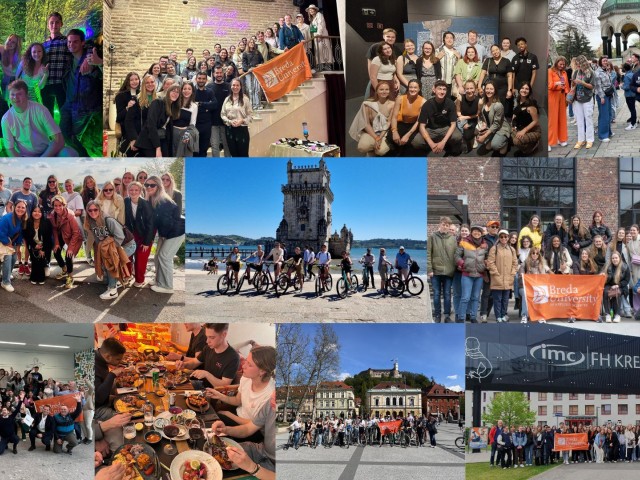
- After pre-university education (vwo) - fast-track
If you have a pre-university education (vwo) diploma and meet the programme requirements, you can complete the Tourism Management programme within three years (accelerated track). Please email [email protected] for more information.
With the accelerated programme, you start in year 1 and skip two semesters from the second semester of year 2 onwards. Because you can determine the structure of your programme yourself, you are then free to organise the remaining three semesters as you wish. You will also complete at least two blocks of work placement in the accelerated programme. .
With this background, you will also qualify for our three-year academic programme Bachelor of Science Tourism.
- After a propaedeutic certificate (professional or academic)
If you have a propaedeutic certificate from an economic professional (hbo) or academic (wo) degree programme, you can complete the Tourism Management programme within three years (accelerated track). You will then follow the same programme as pre-university education students (fast track).
Send an email to [email protected] for more information.
- Mhbo track for higher general secondary education (havo) pupils
Are you almost finished with a higher general secondary education (havo) but in doubt about a direct transfer to a higher professional education (hbo)? Then we have a solution for you: an mhbo track. Together with De Rooi Pannen, BUas offers a programme that allows you to obtain a secundary vocational education (mbo level-4) diploma and a higher professional education diploma in your field of interest in five years!
If you are thinking of further education in tourism, media or the events industry, you may want to consider this option: mhbo Tourism | Leisure | Creative Business
You take this fast-track level 4 programme at De Rooi Pannen in Tilburg or Breda. After two years, you will obtain your secundary vocational education diploma and have a choice of three higher professional education programmes at BUas. Here you will enter in the second year:
- (professional) bachelor Creative Business
- (professional) bachelor Leisure & Events Management
- (professional) bachelor Tourism Management
In other words, you have a little more time to discover your talent: you don’t have to choose your higher professional education programme until after two years.
Read here how the tailor-made track for higher general secundary education pupils works (in Dutch).
- Associate degree
After completing the Associate degree Tourism & Leisure at BUas or with an Ad diploma from another programme in the field of tourism, leisure or hospitality, you can obtain your bachelor's degree in Tourism Management via an accelerated track (2 years).
Email [email protected] for more information and conditions.
At BUas, you develop your entrepreneurial skills in all programmes. You can also join BUas Startup Support (BUSS), where you attend networking meetings and receive guidance from a startup coach.
Would you like to graduate with your own company? You can do that at any academy, although a selection procedure may apply. Whether you are already generating revenue or just have an initial idea, BUas Startup Support will help you.
Read more about starting your own business.
- Year 1
-
Year 1 consists of four nine-week blocks. In each block, you will work on a new project for real clients, introducing you to the dynamic field of tourism. This allows you to immediately apply theory in practice.
Topics such as tourism knowledge and skills such as research, business economics and marketing are covered in the projects.
- Block 1: Travel Experience Design
In this block, you will learn how to turn travellers' expectations into unforgettable travel experiences. This begins online, where we trigger feelings of 'wanderlust' in holidaymakers looking for travel experiences. 'Wanderlust' stands for the desire to step out of one’s own world for a while and experience something different. It is the urge to travel. If you can turn that into a fantastic product that travellers will want to book, then you are exactly what the tourism industry is after.
An assignment within this theme may be creating a new, meaningful travel concept for a small travel business or a big one like TUI.Want to know more about this project? Read here: Festive conclusion of block 1: Travel Experience Design.
- Block 2: Destination Development
In this block, you take the step from visiting a destination to understanding a destination. In other words, during this project, you will do research at the destination itself, which we call fieldwork. You will discover the story behind the destination and engage in conversation with stakeholders such as entrepreneurs and residents. And you will present your results in the form of a short film or documentary during the 'Untold Stories' film festival.
Curious? Take a look at an example of the block 2 presentation afternoon.
- Block 3: Travel Mobility
In this block, you will tackle the challenge of how we can travel - discovering the world and ourselves - while protecting the environment. You will explore the current landscape of tourism and travel and brainstorm ways to shake things up. Who and what do you need to consider? What trends and opportunities have the potential to reshape the way we travel – not only at the destination itself, but also the journey to get there? How do we make travel greener without losing the fun factor for everyone?
Curious about project examples? See how students explore the world of Travel Mobility.
- Block 4: Tourism Hospitality
You will look for new forms of hospitality in the context of tourism and leisure. We are all familiar with the idea of hospitality, but what exactly is it? What do tourists expect in this area today? Boundaries are blurring, with trends like ‘workation’, blending business and leisure. You will learn to experience the essence of hospitality in order to then use what you’ve learned to create ‘the holiday homes, safari tents or glamping lodges of tomorrow’.
- Year 2, 3 and 4
-
In the first semester of year 2, you will work on two tourism projects. After that, you will have the opportunity to determine your own study route by choosing a challenge, an exchange or a placement.
A challenge is a form of education in which students, together with lecturers and professionals from the field, work on issues from the world around us. These are mostly real-world issues in society for which they develop solutions, aiming to improve the travel industry.Available options:
Year 2:
- In semester 3: two tourism projects.
In semester 4: choice of tourism challenges or challenges in another BUas programme, exchange, minor, placement or specialisation.
Year 3
- In semester 5: choice of tourism challenges or challenges in another BUas programme, exchange, placement, placement or specialisation.
- In semester 6: tourism challenges or challenges in another BUas programme, exchange, placement, placement or specialisation.
Year 4
- In semester 7: choice of tourism challenges or challenges in another BUas programme, exchange, traineeship, minor or graduation project.
- In semester 8: choice of tourism challenges or challenges in another BUas programme, exchange, traineeship, minor or graduation project.
The basic rules are as follows:
- You will do a placement of at least one semester
- You can spend one semester doing an international exchange
- You can spend one semester doing a minor
- You will do one graduation project
- Placement
You will go on a placement of a minimum of twenty weeks. During your placement, you will gain practical experience, discover what suits you best and prepare yourself for a job in the tourism and recreation field. The programme has an extensive national and international network, offering a wide choice of placements, both at home and abroad. You can make use of this network or look for a suitable placement yourself. The student affairs team will support you in your search for a placement.
Do you think 20 weeks is not enough in terms of a placement? You can also choose to do several placements during your studies.
Here are a few placement examples:- Communication at Landal GreenParks
- Sun holidays at TUI
- Sustainability at Transavia
- Marketing & social media influencer at NBTC Holland Marketing
- EF International Language School in Madrid
- Marketing at Corinthia Hotels Malta
- Sales at Happy Gringo Travel in Ecuador
Read Rianne’s story to find out how everything she learned in her studies fell into place during her placement. And check out a day in the life of Jaleesa’s placement at EF International Language School in Sydney.
- Exchange
Studying abroad is the perfect opportunity to push your boundaries. You build up an international network, learn a new language, and gain insight into intercultural differences. BUas works with universities all over the world, so as an exchange student you have plenty of options.
- Minors
With a minor, you choose for yourself: do you want to specialise in your field or broaden your knowledge? You can take a minor at BUas, but you can also choose to do a minor at another Dutch university of applied sciences, or even abroad.
- Pre-master
In your final year of study, you may choose to attend the academic pre-master's track in [nhtv:strSBMM] (SBM). This pre-master will give you direct access to Master of Science programmes at top universities such as Maastricht, Rotterdam, Tilburg, Antwerp (B), and Warwick (UK). You can also move on to our university master's degree in Leisure and Tourism Studies. This way, you can earn a university master's degree in just five years – or even in four years, through the accelerated (three-year) track.
- Foreign languages
Are you interested in a foreign language and culture, such as Spanish? If so, you can choose the minor in Language and Culture. We will immerse you in the culture of the country. You will join at your own level and learn what you need to be effective and successful in this language.
- Challenges
From semester 4 in year 2 onwards, you can choose a real-world challenge in tourism or another programme within BUas. These challenges typically address pressing societal issues where you will develop solutions to make the travel world more sustainable, inclusive and inspiring. You will have the freedom to design your own approach and take the lead in examining these complex issues from multiple perspectives, creating meaningful change through your research and creativity.
You choose a theme that you want to explore in depth, such as sustainable and digital transformation, business innovation, and the societal impact of tourism. You can choose to study one block and then switch to another theme, or you can choose to specialise in one theme for the rest of your studies.
- Attractions & Theme Parks Management
From the second year, you can choose to pursue the two-year Attractions & Theme Parks Management (ATPM) track. This is a specialisation offered to students from the Tourism Management, Facility Management, and Leisure & Events Management programmes.
Why this specialisation?
The number of attraction and theme parks is still growing and the competition is fierce. It’s not just theme parks that are constantly reinventing themselves; holiday resorts, zoos, shopping centres and museums - to name a few examples from your future field of work - also focus more and more on creating memorable experiences. In addition, there is still much to gain in terms of corporate social responsibility. In short, things can and must change to become more experiential and more sustainable.A new generation of managers
There is great demand for a new generation of managers capable of creating successful and meaningful concepts and experiences (concept design) from a business perspective (business design). In this specialisation, you will learn how to innovate products and services to create added value for both visitors and the company you work for.The challenge
There is no such thing as a one-size-fits-all business model in the world of attraction and theme parks. The challenge is to make the right combinations and come up with something that makes you stand out and builds goodwill. An example? Zoos are making a turn towards a more ethical and educational approach, whereas museums are adding a bit more experience and interaction. And theme parks try to immerse people in complete themed worlds. Digitalisation, AI and sustainability are playing an increasing role at all parks, and we also pay a lot of attention to these themes within BUas.What will you do?
You will dive into the world of marketing, finance, workforce planning and safety, because you need that knowledge. But you will also explore the fields of Hospitality, Imagineering and Storytelling. You will work on your creative leadership skills and learn about change management. Each course is linked to a real client from the world of attractions. During your studies, you can do a placement at ‘world parks’ such as Walt Disney World in Orlando, Europa-Park, and Efteling.More information can be found on the webpage of Attractions & Theme Parks Management.
- Social Innovation
Starting in your second year, you can dive into the three-year Social Innovation track. This is an ideal choice for anyone studying Tourism, Facility or Leisure & Events who is socially conscious and eager to make a meaningful contribution.
Social Innovation is all about coming up with solutions with people, not just for them. You will team up with fellow students in the Performatory on campus to brainstorm creative solutions to societal issues in areas like health, equality, human rights, and the environment.
Examples of project challenges include:
- Finding ways for tourism to benefit local communities
- Organising a dance party for people experiencing homelessness
- Designing future-ready workspaces
You will tackle real-world problems for all kinds of organisations, just think of sports events organisers, theatres, museums, festivals, and also healthcare institutions and governments. You will often work across different sectors, collaborating with new people while expanding both your network and experience.
Social Innovation at BUas boasts a vibrant community with diverse backgrounds and areas of expertise. A unique aspect of this track is that you get to shape your own learning journey.
You will choose your own topics and projects within a clear framework. Each year, you will engage in about eight hands-on projects, utilising design-thinking skills. What’s more, you will work in self-chosen teams, mixing with students from other years and programmes.
Here you can find more about the specialisation Social Innovation.
- Transformative Airlines and Airport Management (TAAM)
Aviation is changing rapidly – and with TAAM, you can be part of it! It’s a 2-year specialisation combining four fields: aviation, logistics, facility management and tourism. While others focus on just one aspect, you’ll learn how everything comes together to create unforgettable travel experiences. Students in Tourism Management, Facility Management, Logistics Management or Logistics Engineering who have successfully completed their first year can take this English specialisation in years 2 and 3.
You’ll become a leader in airport management and business strategy, with an eye for customer experience and sustainability. You’ll learn how to make the travel industry greener using smart technology and circular solutions. All of this in small groups, with personal guidance and direct contact with industry professionals.
Here you can find more information about this specialisation.
- Training company NewWays
From year 2 onwards, you can opt for a 20-week placement at our training company NewWays. You can also choose to complete a 40-week traineeship in your graduation year. At NewWays, you will organise a variety of trips and (business) events for BUas.
- In semester 3: two tourism projects.
- Teaching method
-
You learn by doing
During this programme, you will work on assignments for real companies. In year 1, you will start with projects, and from semester 4 of year 2 onwards, you can choose to take on challenges.Projects follow a structured process with a clearly defined end goal. You will tackle real questions from actual clients in the industry. Challenges offer you and your team the freedom to define your own goals. These typically focus on societal issues where you will develop innovative solutions to make the travel world more sustainable, inclusive and inspiring. You are in control of the approach.
No timetable or traditional exam weeks
You do not have a changing timetable every hour. On Mondays, Wednesdays and Friday mornings, you work on your project or challenge on campus. You plan the rest of the week yourself: at home or at school, alone or with your group.There are no standard exam weeks here – instead, you will be assessed through a variety of presentations, assignments and knowledge tests. This means no high-pressure snapshots of your performance, but rather a comprehensive view of your development over time.
Training courses, workshops and feedback sessions are offered to support you.
Learning community
You will work in a small group within a learning community. In a learning community, you learn by doing, researching, discovering, and reflecting together. You do this with students, lecturers and professionals from the field. In this way, you develop skills that you can put to good use later in the business world. You also work on individual skills.In charge of your own educaton
You choose how and where you learn, together with your group or independently. You are allowed to make mistakes; that is how you learn. With the help of lecturers and fellow students, you develop ownership of your studies, something that will serve you well in the professional field. With us, you determine the focus of your studies and how and where you want to learn. This independent and active approach is essential preparation for your future career. - Study load and coaching
-
The study load amounts to an average of 40 hours per week per year. How many hours you actually spend studying varies greatly, depending on your personal approach, and fluctuates from week to week.
You will have 2.5 days of classes on campus, for example Monday (full day), Wednesday (full day), and Friday morning*. These are fixed days that remain the same throughout the year. During these days, you will follow a fixed and structured schedule of supervised work on your project and you are required to be present at school.
On the other days of the week, you will work independently or with your group on individual and group assignments. You can decide for yourself whether you want to do this on campus or from home, for example.
In short, on these days you will keep actively engaged with your coursework too. You will receive instructions from the lecturers and be inspired by mini-lectures that provide exactly the guidance and support you need to complete your assignments successfully.
* The definitive schedule may vary depending on specific circumstances and organisational changes.
- Personal development
The Lumina Spark method will help you discover who you are and what you have to offer. You will gain insight into your personal preferences, your behaviour and how you react in different situations. You will learn to look at yourself and others from different perspectives.
Self-awareness is the basis for many personal and professional skills that you can use in your future personal and working life, such as reflection, effective collaboration, giving feedback, and dealing with stressful situations. By understanding yourself and others better, you take a big step towards success.
- A typical week
A typical week in year 1 of the Tourism Management programme in academic year 2024-2025 will look like this for you: Monday (full day), Wednesday (full day) and Friday (morning) you will work on a project at school in your learning community. During these days, you will follow a fixed and structured schedule of supervised work on your project. During these days, your attendance at school is compulsory. On the other days of the week you will work independently or with your group on individual and group assignments. You will decide for yourself, or in consultation with your group, whether you do this at school or from home. In short, on these days too, you will be actively involved in your education.
Daily structure on Monday (full day) – Wednesday (full day) – Friday (morning):
- 10.00 to 12.30 hrs: supervised work on your project
- 13.00 to 16.00 hrs: supervised work on your project
During the projects, you will work together intensively with various lecturers and students. You will receive instructions from your lecturers and be inspired by mini-lectures that will give you the right guidance to do your project well.
Please note: This description gives a general idea of a typical week of first-year students in the 2024-2025 academic year. No rights can be derived from it. The final study timetable may vary depending on specific circumstances and organisational changes.
Student well-being
BUas encourages and helps you to make the most of yourself, whatever your circumstances. Maybe you have a chronic illness, are a family carer, a competitive athlete, or juggle your studies with running your own business? Our study coaches, student counsellors and student psychologists are here to help. Do you need extra support or advice? Or extra facilities? Then take a look at the options here. - Specialisations
-
From year 2 onwards, you choose a theme that you want to explore in depth and tackle challenges related to this theme. You can choose a different theme for each block, or you can choose to specialise further within a single theme. You can also opt for two- or three-year specialisations in collaboration with other programmes.
- Travel Mobility Theme
Exploring and developing responsible ways of travelling. An example of a challenge is the question: How can you motivate adventurous travellers to travel by train instead of by plane? What solutions can you come up with – for Eurail, for example – to make travelling by train within Europe easier?
- Tourism Hospitality theme
Exploring and combining new forms of hospitality in tourism. How can you take hospitality to the next level and integrate it more seamlessly into products like cruises, holiday parks, and day attractions?
- Destination Development theme
This theme focuses on designing attractive tourist destinations that benefit both visitors and residents. It is all about ‘Rethinking Tourism’ during fieldwork. How will you make a personal impact on destinations by developing sustainable solutions for local tourism businesses?
- Travel Experience Design theme
Transforming travellers' expectations into unforgettable experiences. Using ‘Design Thinking’, you will solve complex problems for various travel companies, learn how to make prototypes, and experiment with them, and put them to the test.
- Attractions & Theme Parks Management specialisation
In this two-year specialisation, you will learn how to make attractions and theme parks stand out in an increasingly competitive sector. You will work together with students from the Tourism Management, Facility Management, and Leisure & Events Management programmes.
More information about Attractions & Theme Parks Management.
- Social Innovation specialisation
If you would like to make a meaningful contribution to society, this is an ideal choice. In this three-year specialisation, together with students from the Tourism Management, Facility Management and Leisure & Events Management programmes, you will learn how to contribute to major societal challenges such as social inequality and food security by actually taking action.
More information about Social Innovation.
- Transformative Airlines and Airport Management (TAAM)
Aviation is changing rapidly – and with TAAM, you can be part of it! It’s a 2-year specialisation combining four fields: aviation, logistics, facility management and tourism. While others focus on just one aspect, you’ll learn how everything comes together to create unforgettable travel experiences. Students in Tourism Management, Facility Management, Logistics Management or Logistics Engineering who have successfully completed their first year can take this English specialisation in years 2 and 3.
You’ll become a leader in airport management and business strategy, with an eye for customer experience and sustainability. You’ll learn how to make the travel industry greener using smart technology and circular solutions. All of this in small groups, with personal guidance and direct contact with industry professionals.
Here you can find more information about this specialisation.
- Field trips and excursions
-
We refer to study trips and excursions as fieldwork. This means that we do not just study the destination and its organisations in the lecture hall, but also see and experience them on location, allowing you to apply the skills you have learned.
Learning on location and internationalisation are important, if not indispensable, parts of your Tourism Management programme and extremely valuable for your personal development and creativity.
In the first year, you will visit cities such as Bruges or Antwerp. In year 2, you will go on two fieldwork trips to Albania or Morocco, for example, depending on the project and the client.
In addition, we will visit various companies as well as, for example, the Holiday Fair in Utrecht and the international tourism fairs in London (WTM) or Berlin (ITB).
- Study track after Ad, vwo, hbo or wo
-
- After pre-university education (vwo) - fast-track
If you have a pre-university education (vwo) diploma and meet the programme requirements, you can complete the Tourism Management programme within three years (accelerated track). Please email [email protected] for more information.
With the accelerated programme, you start in year 1 and skip two semesters from the second semester of year 2 onwards. Because you can determine the structure of your programme yourself, you are then free to organise the remaining three semesters as you wish. You will also complete at least two blocks of work placement in the accelerated programme. .
With this background, you will also qualify for our three-year academic programme Bachelor of Science Tourism.
- After a propaedeutic certificate (professional or academic)
If you have a propaedeutic certificate from an economic professional (hbo) or academic (wo) degree programme, you can complete the Tourism Management programme within three years (accelerated track). You will then follow the same programme as pre-university education students (fast track).
Send an email to [email protected] for more information.
- Mhbo track for higher general secondary education (havo) pupils
Are you almost finished with a higher general secondary education (havo) but in doubt about a direct transfer to a higher professional education (hbo)? Then we have a solution for you: an mhbo track. Together with De Rooi Pannen, BUas offers a programme that allows you to obtain a secundary vocational education (mbo level-4) diploma and a higher professional education diploma in your field of interest in five years!
If you are thinking of further education in tourism, media or the events industry, you may want to consider this option: mhbo Tourism | Leisure | Creative Business
You take this fast-track level 4 programme at De Rooi Pannen in Tilburg or Breda. After two years, you will obtain your secundary vocational education diploma and have a choice of three higher professional education programmes at BUas. Here you will enter in the second year:
- (professional) bachelor Creative Business
- (professional) bachelor Leisure & Events Management
- (professional) bachelor Tourism Management
In other words, you have a little more time to discover your talent: you don’t have to choose your higher professional education programme until after two years.
Read here how the tailor-made track for higher general secundary education pupils works (in Dutch).
- Associate degree
After completing the Associate degree Tourism & Leisure at BUas or with an Ad diploma from another programme in the field of tourism, leisure or hospitality, you can obtain your bachelor's degree in Tourism Management via an accelerated track (2 years).
Email [email protected] for more information and conditions.
- Entrepreneurship
-
At BUas, you develop your entrepreneurial skills in all programmes. You can also join BUas Startup Support (BUSS), where you attend networking meetings and receive guidance from a startup coach.
Would you like to graduate with your own company? You can do that at any academy, although a selection procedure may apply. Whether you are already generating revenue or just have an initial idea, BUas Startup Support will help you.
Read more about starting your own business.
What makes this study programme unique
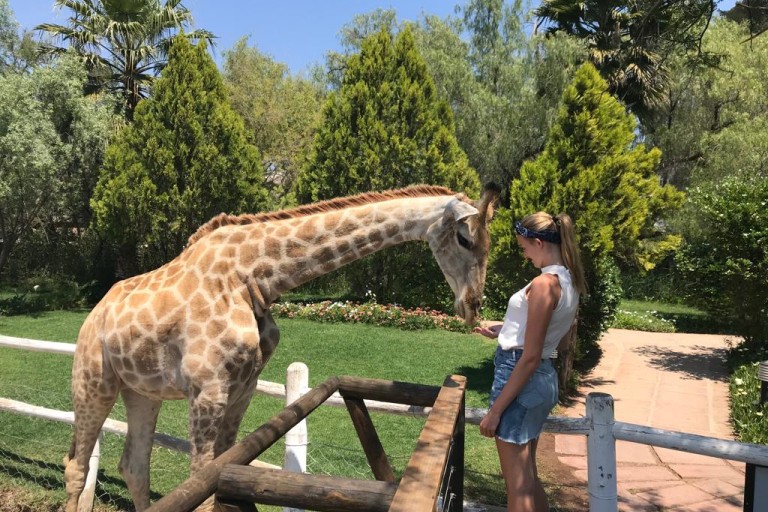
Go abroad
You don’t learn this profession in the lecture hall alone. So, you will get out and step into the practical world abroad to get to know other cultures.
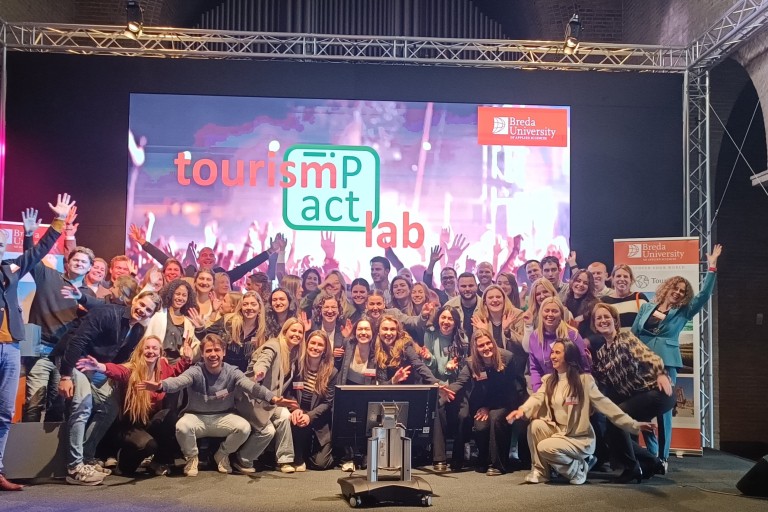
Tourism Impact Lab
Together with researchers and professionals from the industry, BUas students develop their Storytelling & Experiences talent.
Admission & application
- What are the admission requirements?
-
To be admitted to this degree programme, you need a higher general secondary education (havo) or pre-university education (vwo) diploma or an equivalent of these Dutch diplomas. You can also be admitted with a secondary vocational education (mbo level-4) diploma.
- Check out the complete admission requirements and the possibilities if you do not meet the requirements
- Additional requirements have been set for the 3-year track.
- What does this study programme cost?
-
In the academic year 2026-2027 the statutory tuition fee for bachelor's programmes is €2,695. In addition, you should take extra costs for software, excursions, etc. into account.
- How can I apply?
-
If you meet the admission requirements, you can apply for this study programme. If you do so before 1 May, you can certainly start your studies.
What others say about Tourism Management
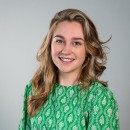
I studied in Mexico
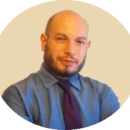
I love the international vibe
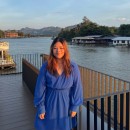
Global Career, after my Placement
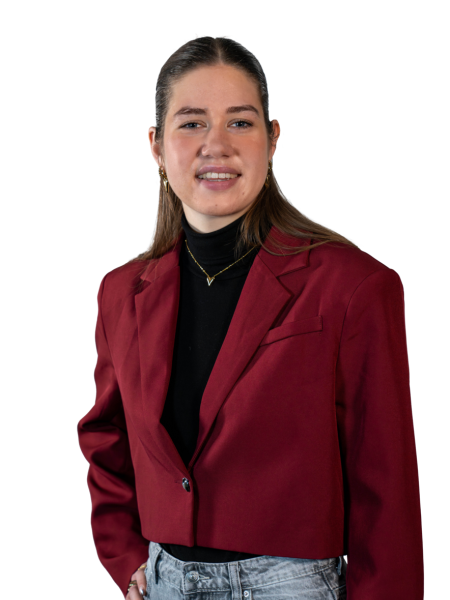
Your future starts here
- The job market needs you
Explore your career options - Choose your path
Discover your potential - Learn from the best
Graduates share their experiences
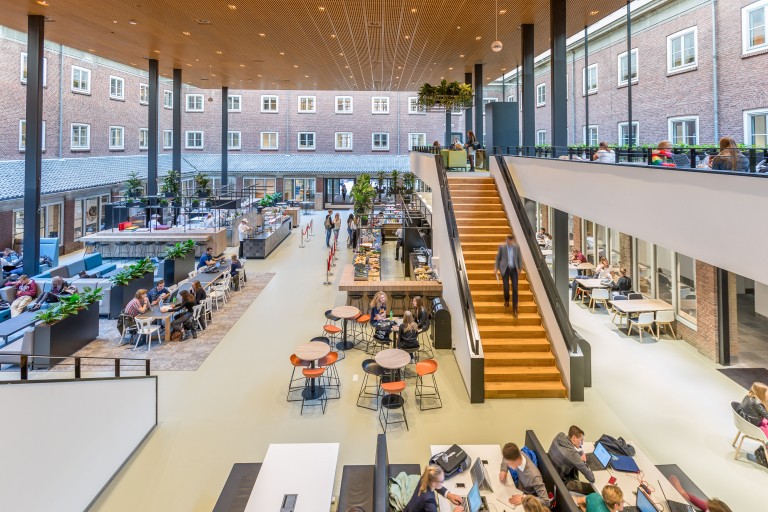
Virtual campus tour
Have a virtual look and discover the Horizon building where you’ll be studying and what more the campus has to offer.
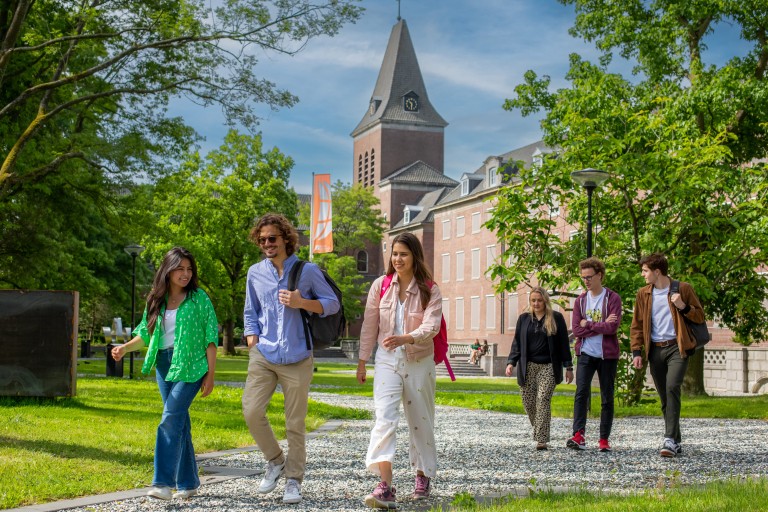
Studying at BUas
What is it like studying at BUas? What does the campus look like and what activities can be undertaken? Is Breda actually a vibrant university town?
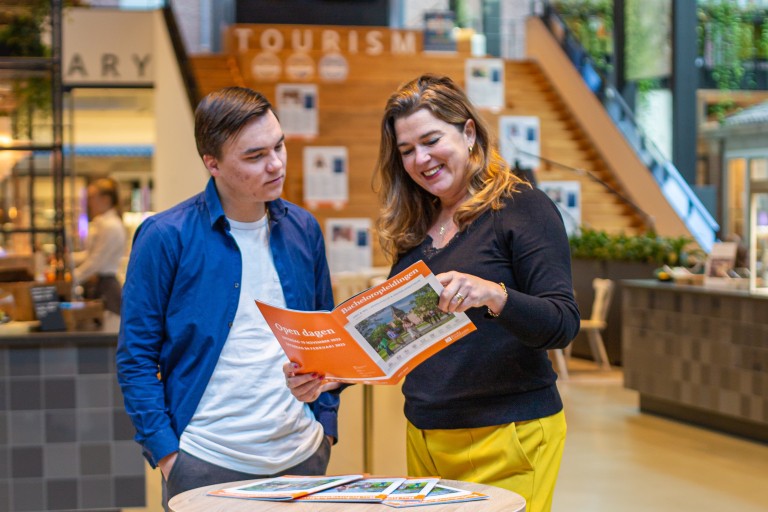
Assistance in choosing your study programme
Do you already know exactly what you want to study or do you not have any clue at all? Find out, compare and choose your professional/ academic bachelor’s or master’s programme at BUas.

